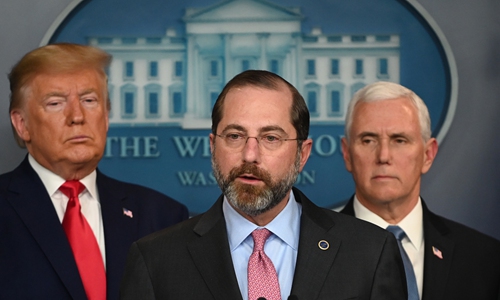Azar's Taiwan visit intensifies provocation
By Zhang Hui Source: Global Times Published: 2020/8/5 21:52:25
Odds of military conflict high 'if US crosses line'

Health and Human Services Secretary Alex Azar (center) speaks during a press conference on the COVID-19 outbreak as US President Donald Trump (left) and US Vice President Mike Pence look on at the White House in Washington, DC. Photo: AFP
The US health secretary's scheduled visit to the island of Taiwan in a few days, which marks the highest level visit by a US official in more than four decades, shows that Washington is likely to send more officials from sensitive departments, such as foreign affairs and defense, to visit the island, Chinese mainland experts said.
Potential provocations from the US could immediately escalate tensions with China, and the danger of a military conflict will increase. If the US ignores China's warning and firm stance on its sovereignty over the island, a war in the region would be inevitable, analysts said.
The separatist authority on the island is willing to play the most loyal card for the US, and would love to cooperate with the US to provoke the mainland, and this could eventually cross the bottom line set by the mainland, which would make a military conflict more and more likely to happen, analysts added.
US Health and Human Services (HHS) Secretary Alex Azar will lead a delegation to the island of Taiwan a few days from now. This marks the first visit to the island by an HHS Secretary, the first Cabinet member to visit the island in six years, and the most senior official to make such a trip since 1979, when China and the US established diplomatic ties, and Washington cut "diplomatic ties" with the Taiwan authority, the HHS website said.
Azar praised Taiwan as a "model of transparency and cooperation in global health during the COVID-19 pandemic." He said this trip represents an opportunity to strengthen economic and public health cooperation with the island.
Chinese Foreign Ministry spokesperson Wang Wenbin said at a routine press conference on Wednesday that China has lodged solemn representations to the US, and urged the US not to send wrong signals to Taiwan secessionists.
The US should "stop all official exchanges with Taiwan…and avoid undermining China-US relations and the stability of the Taiwan Straits," Wang said.
Ma Xiaoguang, spokesperson of the Taiwan Affairs Office of the State Council, also said in a statement on Wednesday that the Democratic Progressive Party (DPP) authority on the island is willing to "play a pawn" for Washington and colluding with the US to seek political gains, and this is "extremely dangerous and doomed to fail."
Azar's visit comes after former US president Barack Obama sent Environmental Protection Agency (EPA) Administrator Gina McCarthy to Taiwan in 2014. In 2000, then president Bill Clinton also sent the secretary of transportation to Taiwan.
Azar would be the highest US official to visit the island, as the HHS secretary is more senior than the transportation secretary in terms of the presidential line of succession in the US.
The visit would be more provocative amid tensions in China-US relations and cross-Straits relations, and will trigger a tough response from the mainland, Xin Qiang, deputy director of the Center for American Studies at Fudan University in Shanghai, told the Global Times on Wednesday.
The Trump administration has intensified its containment policy against China with several "punches," including a trade war, the South China Sea issue, Hong Kong, Taiwan and Xinjiang, as well as the blame game on COVID-19, experts said.
Among them, "the Taiwan card" is the most effective, sensitive and vital tool to provoke the mainland, Chang Ya-chung, a professor at the National Taiwan University, told the Global Times on Wednesday, noting that Washington will play two cards at the same time on Azar's trip: Taiwan and the coronavirus blame game.
The separatist DPP authority would also like to be "the most important tool" for the US to provoke the mainland, Chang said.
The US has been helping the island seek a greater presence in the international arena during the COVID-19 pandemic, over-praising the island and harshly and groundlessly criticizing the mainland.
Chang said that the Trump administration will make best use of the Taiwan card before November's presidential elections to gain more support from conservative voters with sinophobia, and is likely to continue upgrading its relations with the island by sending more officials from sensitive departments, such as foreign affairs and defense, to Taiwan.
These are old and little tricks played by the Trump administration and the separatist authority of the island since Tsai Ing-wen, the current leader of the island and the chairwoman of the DPP, took office, Xin said.
The Trump administration keeps using these tricks "to provoke China from time to time, but dares not risk a complete break-up by crossing the bottom line," as it is scared of China's powerful influence and diplomatic, military and economic strength. Once a "complete break-up" happens, the cost and loss will be unbearable for the US, Xin said.
If the US plays "the Taiwan card" too much, that would result in "the card being ripped up," and Taiwan would face huge losses, Xin noted.
Analysts said a military conflict in the Taiwan Straits will be unavoidable if the US and the separatist authority on the island continue to make more provocations, such as having more high-level official contacts and military cooperation against the Chinese mainland.
Ezra Vogel, Professor Emeritus at Harvard University and a leading American scholar on East Asian affairs, warned in an exclusive interview with the Global Times that there is real danger of war between China and the US "if Beijing leaders fear that the pressure of "Taiwan independence" crosses a red line."
"A conflict over Taiwan could escalate into an all-out war that could be devastating to all mankind. We must develop an understanding between Chinese and American leaders to avoid this great danger," he said.
Posted in: DIPLOMACY